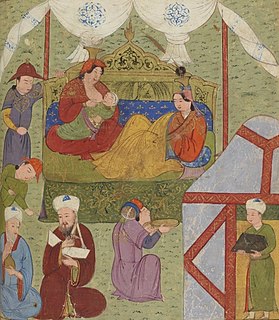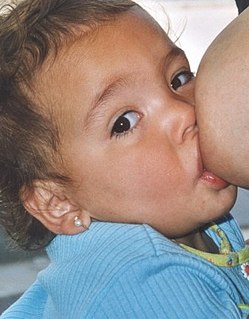Related Research Articles

Infant formula, baby formula or just formula or baby milk, infant milk or first milk, is a manufactured food designed and marketed for feeding to babies and infants under 12 months of age, usually prepared for bottle-feeding or cup-feeding from powder or liquid. The U.S. Federal Food, Drug, and Cosmetic Act (FFDCA) defines infant formula as "a food which purports to be or is represented for special dietary use solely as a food for infants by reason of its simulation of human milk or its suitability as a complete or partial substitute for human milk".

A wet nurse is a woman who breast feeds and cares for another's child. Wet nurses are employed if the mother dies, or if she is unable or elects not to nurse the child herself. Wet-nursed children may be known as "milk-siblings", and in some cultures the families are linked by a special relationship of milk kinship. Mothers who nurse each other's babies are engaging in a reciprocal act known as cross-nursing or co-nursing. Wetnursing existed in cultures around the world until the invention of reliable formula milk in the 20th century.

Breast milk or mother's milk is milk produced by mammary glands located in the breast of a human female to feed a young child. Breast milk is the primary source of nutrition for newborns before they are able to eat and digest other foods; older infants and toddlers may continue to be breastfed, but solid foods should be introduced in combination starting from six months of age.
The Special Supplemental Nutrition Program for Women, Infants, and Children (WIC) is a federal assistance program of the Food and Nutrition Service (FNS) of the United States Department of Agriculture (USDA) for healthcare and nutrition of low-income pregnant women, breastfeeding women, and children under the age of five. Their mission is to be a partner with other services that are key to childhood and family well-being. The basic eligibility requirement is a family income below 185% of the federal poverty level. Most states allow automatic income eligibility, where a person or family participating in certain benefits programs, such as the Supplemental Nutrition Assistance Program, Medicaid, or Temporary Assistance for Needy Families, may automatically meet the income eligibility requirements. Currently, WIC serves 53 percent of all infants born in the United States.

Lactational amenorrhea, also called postpartum infertility, is the temporary postnatal infertility that occurs when a woman is amenorrheic and fully breastfeeding.

Erotic lactation is sexual arousal by breastfeeding on a woman's breast. Depending on the context, the practice can also be referred to as adult suckling, adult nursing, and adult breastfeeding. Practitioners sometimes refer to themselves as being in an adult nursing relationship (ANR). Two persons in an exclusive relationship can be called a nursing couple.

Marian Leonard Tompson is one of the seven founders of La Leche League International. She was President of La Leche League for 24 years, from 1956 to 1980, and a member of the Founders Advisory Council. Wife of the late Clement Tompson, she is the mother of seven children, a grandmother and great-grandmother. An early advocate of home birth, four of her children, and many grandchildren and great-grandchildren were born at home.

The history and culture of breastfeeding traces changing social, medical and legal attitudes to breastfeeding, the act of feeding a child breast milk directly from breast to mouth. Breastfeeding may be performed by the infant's mother or by a surrogate, typically called a wet nurse.
Lactivism is the doctrine or practice of vigorous action or involvement as a means of achieving a breastfeeding culture, sometimes by demonstrations, protests, etc. of breastfeeding. Supporters, referred to as "lactivists", seek to protest the violation of International Code of Marketing of Breast-milk Substitutes by formula companies and industry.

Breastfeeding difficulties refers to problems that arise from breastfeeding, the feeding of an infant or young child with milk from a woman's breasts. Although babies have a sucking reflex that enables them to suck and swallow milk, and human breast milk is usually the best source of nourishment for human infants, there are circumstances under which breastfeeding can be problematic, or even in rare instances, contraindicated.

Breastfeeding, also known as nursing, is the feeding of babies and young children with milk from a woman's breast. The World Health Organization (WHO) recommends that breastfeeding begin within the first hour of a baby's life and continue as often and as much as the baby wants. During the first few weeks of life babies may nurse roughly every two to three hours, and the duration of a feeding is usually ten to fifteen minutes on each breast. Older children feed less often. Mothers may pump milk so that it can be used later when breastfeeding is not possible. Breastfeeding has a number of benefits to both mother and baby, which infant formula lacks.
Amy Spangler is a breastfeeding expert and president of baby gooroo who has lectured extensively and published several books on breastfeeding. In addition to earning a bachelor's and master's degree in nursing, Spangler is a registered nurse and an internationally board certified lactation consultant, and she has held leadership positions with national and international organizations including President of the International Lactation Consultant Association. She has also served as an expert contributor to Breastfeeding.com and as a member of their professional advisory board.

The social attitudes to and legal status of breastfeeding in public vary widely in cultures around the world. In many countries, both in the Global South and in a number of Western countries, breastfeeding babies in open view of the general public is common and generally not regarded as an issue. In many parts of the world including Australia, some parts of the United States and Europe, along with some countries in Asia, women have an explicit legal right to nurse in public and in the workplace.
Breastfeeding promotion refers to coordinated activities and policies to promote health among women, newborns and infants through breastfeeding.
The Baby Friendly Hospital Initiative (BFHI), also known as Baby Friendly Initiative (BFI), is a worldwide programme of the World Health Organization and UNICEF, launched in 1992 in india following the adoption of the Innocenti Declaration on breastfeeding promotion in 1990. The initiative is a global effort for improving the role of maternity services to enable mothers to breastfeed babies for the best start in life. It aims at improving the care of pregnant women, mothers and newborns at health facilities that provide maternity services for protecting, promoting and supporting breastfeeding, in accordance with the International Code of Marketing of Breastmilk Substitutes.

In Western countries extended breastfeeding usually means breastfeeding after the age of 12 to 24 months, depending on the culture.
Infant nutrition is the description of the dietary needs of infants. A diet lacking essential calories, minerals, vitamins, or fluids is considered inadequate. Breast milk provides the best nutrition for these vital first months of growth when compared to infant formula. For example, breastfeeding aids in preventing anemia, obesity, and sudden infant death syndrome; and it promotes digestive health, immunity, intelligence, and dental development. The American Academy of Pediatrics recommends exclusively feeding an infant breast milk, or iron fortified formula, for the first six months of life and continuing for one year or longer as desired by infant and mother. Infants are usually not introduced to solid foods until four to six months of age. Historically, breastfeeding infants was the only option for nutrition otherwise the infant would perish. Breastfeeding is rarely contraindicated, but is not recommended for mothers being treated for cancer, those with active tuberculosis, HIV, substance abuse, or leukemia. Clinicians can be consulted to determine what the best source of infant nutrition is for each baby.
The maternal mortality rate is 224 deaths per 100,000 births, which is the 23rd highest in the world. The mean age of mothers at birth is 19.3 years old, and the fertility rate is 5.72 children born per woman, which is the 7th highest in the world. The contraceptive rate is only 40.8%, and the birth rate is the 4th highest in the world at 42.13 births/1,000 population. Infectious disease is a key contributor to the poor health of the nation, and the risk is very high for diseases such as protozoal and bacterial diarrhea, hepatitis A, typhoid fever, malaria, dengue fever, schistosomiasis, and rabies. The adult prevalence rate of HIV/AIDS is 12.37%, which is the 7th highest in the world.
Anna Coutsoudis is a South African public health scientist and academic who has conducted research on HIV and nutrition, specializing in the benefits of breastfeeding. An elected member of the Academy of Science of South Africa, she is a founder member and chair of iThemba Lethu, an organization for children with HIV, which provides a community-based breast milk bank.

Breastfeeding and mental health is the relationship between postpartum breastfeeding and the mother's and child's mental health. Research indicates breastfeeding has positive effects on the mother's and child's mental health. These benefits include improved mood and stress levels in the mother, lower risk of postpartum depression, enhanced social emotional development in the child, stronger mother-child bonding and more. Given the benefits of breastfeeding, the World Health Organization (WHO), the European Commission for Public Health (ECPH) and the American Academy of Pediatrics (AAP) suggest exclusive breastfeeding for the first six months of life. Despite these suggestions, estimates indicate 70% of mothers breastfeed their child after birth and 13.5% of infants in the United States are exclusively breastfed. Breastfeeding promotion and support for mothers who are experiencing difficulties or early cessation in breastfeeding is considered a health priority.
References
- 1 2 "ORCID". orcid.org. Retrieved 29 August 2019.
- 1 2 "Professor Amy Brown". www.swansea.ac.uk. Retrieved 29 August 2019.
- 1 2 Thompson, Sylvia. "The battle between women who breastfeed and women who don't". The Irish Times. Retrieved 30 August 2019.
- ↑ "Barriers to Breastfeeding: Why rates in Wales are amongst the lowest in the world". ITV News. Retrieved 29 August 2019.
- ↑ "Changing breastfeeding policies worldwide - Economic and Social Research Council". esrc.ukri.org. Retrieved 29 August 2019.
- ↑ "Professor Amy Brown from Swansea University named among Nation's Lifesavers". www.swansea.ac.uk. Retrieved 29 August 2019.
- 1 2 3 Dean, Sam (9 September 2016). "Britain has world's lowest breastfeeding rates because young mothers are pressured to 'get their lives back', expert says". The Telegraph. ISSN 0307-1235 . Retrieved 29 August 2019.
- ↑ "What's on". Bristol Food Connections. Retrieved 29 August 2019.
- ↑ "First Steps Nutrition Trust". First Steps Nutrition Trust. Retrieved 29 August 2019.
- ↑ "Scopus preview - Scopus - Author details (Brown, Amy E.)". www.scopus.com. Retrieved 29 August 2019.